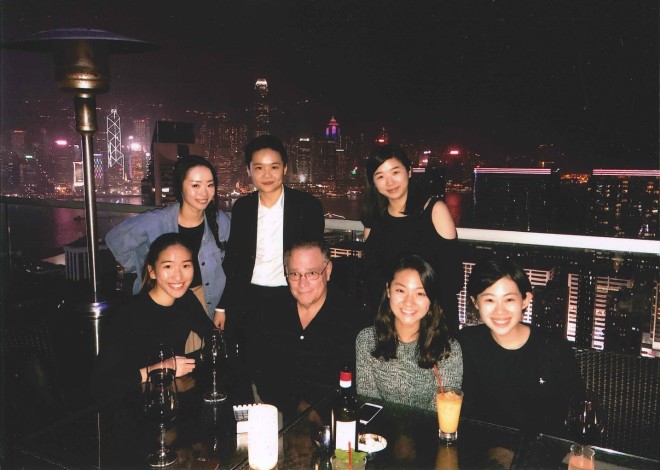
Moot court contest victories put CityU top for legal training

[Sponsored Article]
The continuing success of CityU teams at international moot court competitions can be put down to various factors, but one definitely stands out.
“We train champions, and the key is the amount of work we put in,” says Dr Mark Kielsgard, associate professor in the School of Law and director of mooting and advocacy. “I have no doubt or hesitation in saying that when we go to a competition, we are the best prepared team there. Because of that, we have won ten international championships in the last eight years against teams from scores of countries.”
Those triumphs have come at prestigious events include Championships in the Vis Vienna and the Vis East moots in 2013, winning several local rounds in the Philip C. Jessup International Law Moot Court Competition, as well as winning the International Criminal Court Trial Moot Competition 2012 in The Hague, the Netherlands, where hundreds of teams from around the world take part in. In October 2018, our CityU team beat Singapore National University in the Finals and won the First Prize in the first International Chamber of Commerce (ICC) Mediation Competition Hong Kong.
The broader significance, though, is that each new distinction further confirms the school’s status as one of the best in Asia in training students for the practicalities of professional life as a barrister or solicitor.
“Mooting is by far the most important extracurricular activity a law student can engage in,” says Kielsgard, a former trial lawyer in the United States. “You won’t find any better hands-on experience with regard to writing, drafting instruments, and arguing a case. The benefits are manifest. Average students can become outstanding, while our former mooters tend to do extremely well in legal practice with the leading firms and have published in top-rated academic journals.”
The LLB programme has a mandatory course on mooting, which includes an intra-mural team competition. That ensures everyone acquires the essential skills and gains relevant experience.
However, being picked to represent CityU at one of the big international events takes something extra.
“It is not for the idle curious,” Kielsgard says. “Students have to audition for spots on the team and impress their would-be coach. They also have to understand how much work is involved, because it takes a ‘ridiculous’ commitment. While preparing for the competition, they have to forego everything except their classes, but they will do this if they want to be champions.”
For the audition, students are given a basic, though unfamiliar, problem involving international or arbitration law. They do the research, prepare a short memorandum, and make a 15-minute presentation as if in an appellate court.

“We assess how much effort they have put into the research, what authorities they have cited, and whether they have thought through their arguments, the likely counter arguments, and possible further rebuttals,” Kielsgard says. “The key I’m looking for is depth of reasoning.”
At the initial stage, contenders do not have to be the most fluent speakers, but they must be “trainable”. The build-up to a major competition usually stretches over two semesters and, during that time, the selected students – anything from three to seven depending on the event – begin by analysing the set case.
It may be 10 pages long, with a further 30 pages of factual information and pleadings. The central problem is designed to test different areas of the law, including cutting-edge undecided issues of the day, where a plausible argument can be made for both sides.
Mooters must prepare to argue as applicant/claimant or respondent/defendant, with respective roles only decided on the day of the contest by the toss of a coin.
There are long hours of research and lengthy practice sessions – sometimes all-nighters – to improve the force of an argument. The coaches also work on vocal delivery, tone, gestures, and the ability to think on one’s feet in response to an unexpected twist or a judge’s intervention.
“We expect a team to do very detailed planning for every variable and potential outcome,” says David Holloway, assistant professor in the School of Law, who has been in practice for many years as a barrister in London. “They must go beyond the superficial, understand legal methods, and be willing to absorb ideas. They learn technical skills and how to work under pressure, but we also teach them how to speak effectively, make eye contact, project their personality, and to enjoy the whole moot court experience, rather than dreading it.”
The usual competition format sees each nominated speaker given around 20 minutes to present their case for or against, before proceeding to counter arguments or cross examination.
All the while, other team members are also trying to “read” the judge – generally a professor or practising lawyer – to determine which points are carrying most weight.
“A judge’s questions can take up a lot of time, so mooters must be very aware of the clock; it is a difficult skill to perfect,” Kielsgard says. “So as not to impact on speaking points or miss out an issue, we recommend having full and abbreviated versions.”
By the end of the process, he adds, some students are better than practising barristers at thinking critically, stepping into an opponent’s shoes, and putting an argument in the most favourable light.
“Mooting is the most reliable preparation for working in the world of advocacy and case presentation,” Holloway says. “It turns students into excellent speakers with the skills and confidence to deal with any challenge.”
CityU is hosting the next Vis East competition in March, with around 100 international teams taking part.